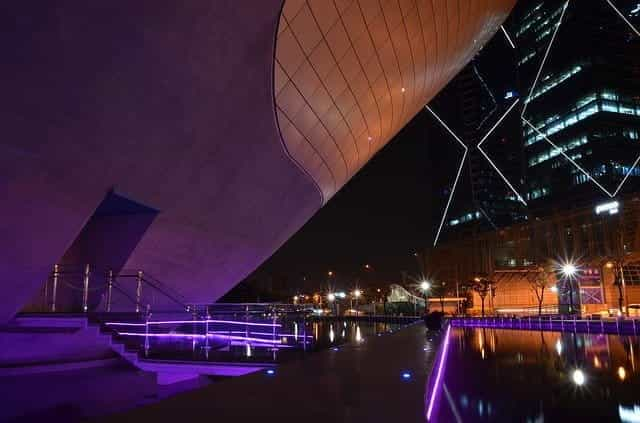South Korea Eyes New Casino Industry to Rival Japan
Following the announcement last year that Japan would be launching their so-called “integrated resorts”, a multiplex of hotels, shopping malls and casinos, in several cities across the country, a power-struggle for market dominance is brewing. The Incheon Free Economic Zone (IFEZ) Authority in South Korea recently made public their intention to launch a rival cluster of casino facilities up and down the country. The South Korean government wants to counter the imminent competitive threat on its own tourism industry that the Japanese “integrated resorts” program will inflict, and they are acting quickly. The zone being proposed by South Korea has already been granted approval by lawmakers, and is now seeking funding to expand the scope of the original plans and build a total of “7 or 8” schemes across the nation.

The Incheon Free Economic Zone has become an attractive alternative investment opportunities for those with an interest in the East-Asian emerging casino industry. ©CreativeNerdTim/Pixabay
There are a number of obstacles between the vision being touted for the Incheon Free Economic Zone and the reality of the economic situation. South Korea is already home to a prospering casino industry, but of the 17 existing venues throughout the country, only one can accept local players. A number of industry analysts who are weighing up the possibilities regarding future investments into a South Korean casino project have suggested that the South Korea pre-disposition of barring locals from its gambling venues could slow down the flow of international investment. In a region that is hotly competitive and already has a growing number of such projects, investors will be seeking projects with several scalable business opportunities for both local and international clients.
The project could face hurdles beyond lack of funding also. With Japanese integrated resorts being increasingly reliant of Chinese patrons in the past, there is a fear that an over-exposure to this market is also an unwise path to pursue. At times in the past, visitor numbers from China have dramatically decreased, often at periods of political tensions between the neighboring countries, and this unpredictable ebb and flow of wealthy international clients create a lot of uncertainty and instability which could scare off investors. The Incheon Free Economic Zone has a number of options going forward but is sticking to its core priorities at this early stage, securing the required $600M investment per casino, and reaching the market by mid-2020 to compete against the imminent launch of Japanese integrated resorts.
IFEZ Great Alternative for Investors
Despite these early teething pains for the Incheon Free Economic Zone project, there are many measurable and clear-cut advantages to the South Korean casino market. Investors have been clearly briefed on the costings of the Incheon Free Economic Zone proposals, locations are practically set in stone of the Yeonjong Island at Incheon and the cost breakdown is meticulous in detail and scope. The Incheon Free Economic Zone, established in 2003, has always been a haven for big international investment opportunities. Since its inception, the Incheon Free Economic Zone has been a hotbed for huge international companies to gain a foothold in the far-East.
For gambling operators, the region is perfectly situated and well within budget. Despite land prices skyrocketing in South Korea, the Incheon Free Economic Zone is subject to much lower rates, and investors are able to secure land for buildings often at much cheaper prices to Japanese and Chinese alternatives. Also, the cost to establish a casino in South Korea is significantly less than the current proposals for Japan. Notwithstanding a total re-structuring of the original business plan, casino operators who fail to secure the license to operate in Japan are very likely to look at the Incheon Free Economic Zone as the alternative route into this emerging market.
Speaking at the G2E Asia Expo last week, Nicholas Kim, an integrated resorts investment manager gave his thoughts on the difference between the South Korean and Japanese markets, in terms of investment attractiveness.
We have about $6.5bn already secured, and require $3.5bn more to launch an integrated resorts project in South Korea. This total IR cluster will fund approximately 18 casino construction projects, which is roughly the same amount to fund the creation of 1 integrated resort in Japan.–Nicholas Kim, Integrated Resorts Investor
Mr. Kim, despite being directly involved in the investment planning within the South Korea industry, admitted that at times there were holes in the system of government oversight. Kim, like many others, has been trying to deal with the pertinent issue of setting up a central casino regulator, which right now doesn’t exist, but is being heavily debated by academics, business people and politicians alike.
South Korean Government Makes Attractive Offer to Investors
The South Korean government has made no secret of the fact that they are prepared to go above and beyond to secure international investment. Publicly stating their intention to launch a casino project to rival the Japanese, creating ideal economic conditions for investors and allocating public money to ensure the projects are completed quickly and to the required specification.
There is a much smaller capital investment required in the IFEZ compared to Japan. Also, the South Korean government has guaranteed IR investors will get a proper casino license, corporate tax will be waived and various other tax breaks will be granted. This benefit package will surely be enough to convince those on the fence regarding the merits of China, South Korea, and Japan.
It is true that the IFEZ model is maybe less profitable, but in light of the benefits package, lower land-leasing costs, less exposure to Chinese tourism footfall swings and a generally more supportive legislative framework, it will be a much less risky investment as a casino project than Japan.
The government is surely hoping to have this generosity repaid, and will be recouping some of the funds invested by revitalizing local economies surrounding the new resorts, and creating an estimated 20,000 new jobs for local residents.



